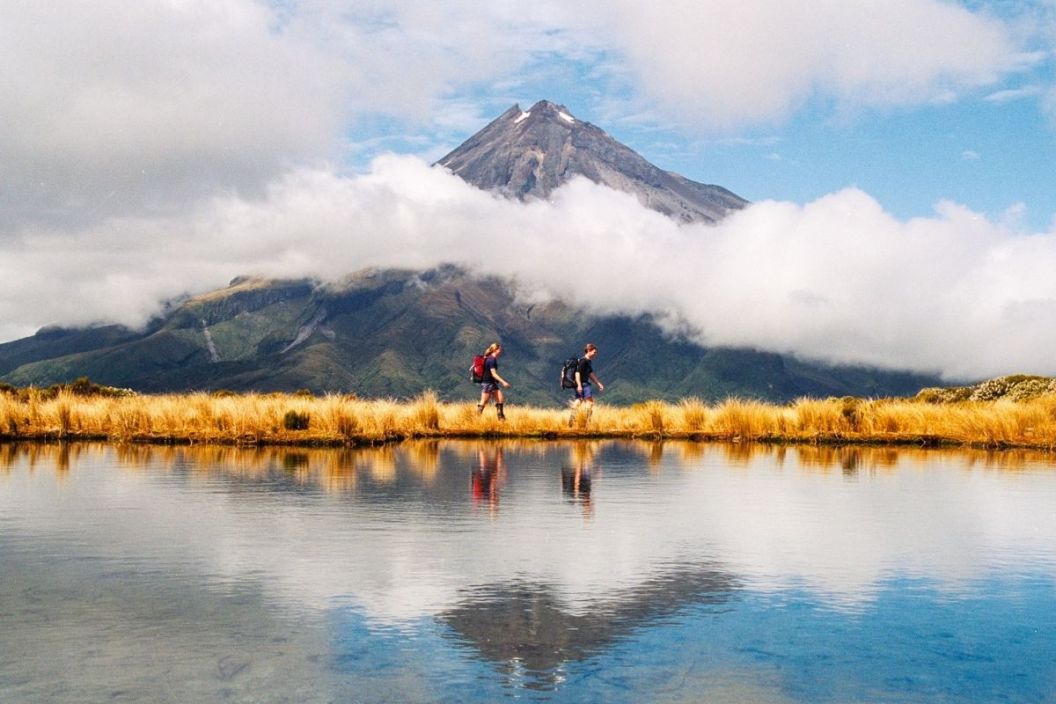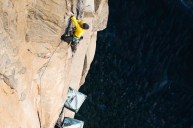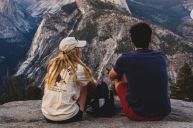"A lot of it is relatively just common sense."
Jason Hagani was shocked to find that someone carved their initials into a 6,000-year-old petroglyph in Zion National Park. The environmental scientist and photographer just returned home from a week-long solo trip exploring the national parks between Utah and Arizona, one of many he's taken on his journey through life. Hagani spoke Wide Open Roads, sharing tips and insights into conservation, the environment, and educating fellow travelers about what it means to truly value and appreciate the natural world we inhabit.
Jason Hagani: Photographer and Environmental Scientist
From a young age, Hagani took an interest in photography that he later carried with him as he studied environmental sciences. Capturing nature's most poetic landscapes made him appreciate the environment more, and seeing these places through a "different lens" helped him connect to nature through a different perspective. In bringing along his camera to his class projects, he was able to combine his passions for both.
"I found that when I started looking through my camera and looking at all these incredible places — I mean, very literally through a different lens — it became easier for me to appreciate it more," Jason told Wide Open Roads. "You sort of, while you're taking photos, try to find some order and find a way to make the chaos make sense. Not that nature needs any help, but it's nice to have a photo that makes sense. And that really helped me appreciate it a lot more."
Now having recently completed his master's degree, Hagani has found more and more opportunities to combine his photography and research, instead of one outshining the other. "My love for the environment came out of my photography passion," he said.
https://www.instagram.com/p/CTSEMrhMQ8V/
Over the past few years, Hagani has been specifically researching human-wildlife conflict, exploring where people and animals clash in negative ways. What started out as a fire within him for saving the environment turned into a realization that there's actually not a concrete solution to saving the environment where people are cut out completely. So, he adjusted his motivations to finding ways for people to visit these natural places safely without harming their surroundings. And although he finds studying human-wildlife conflict fulfilling, he wouldn't object to other research studies within environmental conservation.
When it comes to his photography, he not only hopes to provide an easier means to bridging the gap between scientific research and the general public, but that those who see his photos garner the same desires to be in those breath-taking places that he has.
"The point of my photos isn't to give people an alternative to traveling," he explained. "It's to inspire people to want to go take that same photo themselves. You can only get so much from photos, but you don't get that feeling- what its like to stand there, to be there."
What Can We Do to Help the Environment?
https://www.instagram.com/p/CT7SJlZAXbH/
Hagani understands about the complex relationship humans have with nature, and how there should be a subtle sense of urgency to protect these places that people travel to explore. He explained how ironic it was to feel frustrated at how crowded it was during his trip to Zion National Park, while also finding it endearing that so many people were outside ready to explore.
"The ideal scenario is finding balance to where people can enjoy places without destroying them," he said. "It's really not that hard to not destroy some of these places. I think people just need a bit of a nudge sometimes, some basic rules to learn. That really helped me understand that coexistence is the only solution really."
Along with his educational and research accolades, Hagani has explored almost half of the all the U.S. national parks, waging more than enough credibility behind the advice he offered. His first piece of advice was to explore the areas within our own backyards as a way to practice and get accustomed to exploring the outdoors safely and with more awareness:
"My first piece of advice would be, that there's a lot of cool stuff close to home. I'm from Connecticut, and I never imagined this state being an interesting place when it came to nature, and comparatively it's not. But there's also a lot of beautiful stuff here, and I'm just now getting a chance to explore my backyard a little bit. I'm not saying people shouldn't travel, because traveling is amazing, and I love it. But also, don't forget about the stuff nearby. I think on a certain level, it helps to practice a little bit with places, or hiking and camping, nearby. Especially if you're a first timer, and you haven't acclimated yourself with Leave No Trace or how to effectively hike in a natural place without ruining the environment."
His second piece of advice confronted following hiking trails, warning against the temptations of veering away from them:
"I think the most important thing I've learned is just to stay on the trail... When I first started traveling and taking photos, I definitely went off the trail. If you're not sure, stay on the trail because it's easy to go want to explore. But a lot of times, you're probably damaging some fragile ecosystem or if one person goes off trail, then everyone goes off trail. And three years from now, it can be all trampled down and messed up."
"If you're at a designated hike or doing something that's pretty popular, then you should stay on the trail. It'll make things a lot better in the long run because the ecosystems won't be destroyed."
What Challenges Do We Face in Conserving the Environment?
https://www.instagram.com/p/CReL4YisOIH/
RELATED: "Travel Mamas" Opens Up on Her Family, Kids, and Embracing Life On The Move
Hagani realized many people draw the line at the minimal understanding that nature itself is beautiful — He admits that although nature's beauty was enough for him to want to protect it, he can't expect many others to feel that same level of commitment. He further justified the general lack of awareness in understanding the benefits that nature provides by explaining how he believes people would do a better job taking care of the environment if they were more educated about it.
"There are also plenty of real benefits that we get from having a healthy, thriving ecosystem, planet, and wildlife community- real tangible benefits, more than just the inherent beauty and awesomeness of nature. People might not necessarily be aware of those benefits, and there's some sort of education that needs to be done. I think one of the biggest issues is that there's a pretty large disconnect between the scientific community and the general public. Scientists do a lot of pretty important work, and at times, it can be difficult to communicate all their findings to the general public, especially when it's technical work that's pretty complicated, and you need six years and a Ph.D to get it done. Most people aren't going to understand that. And if people don't understand that, they're not going to have an easy time caring about it. Finding ways to bridge that gap is super important."
Bringing our conversation back full circle to his passion for photography, Hagani explained the connection he made in conserving the environment, his photography, and helping spread awareness.
"I think one way to make a lot of scientific stuff more digestible and readable is with photography.," he said. "In terms of promoting science and getting science in the hands of the general public, one way to make it accessible is with visual arts. It's a lot easier to enjoy studies about wood turtles if there's a photo of a wood turtle. Effective imagery is a way to make important messages accessible to everyone. It's a good place to start."
https://www.instagram.com/p/CRrE-8XsNWe/
The responsibility to care for the earth lies on everyone—not just the general public and not just the scientists and researchers. Hagani owned his responsibility as an environmental scientist to educate others and explain research in digestible and readable ways, saying, "I think it's important for the people doing the research to explain their work to your grandma in a way that she understands and finds interesting."
Hagani also foresees overcrowding as a big issue for national parks. The best solution he offered was the possibility of creating more national parks or designating more areas as national parks to help alleviate the over-polluting. But with that, also comes other challenges.
"It sucks that the environment has become a very political issue, but it is." he explained. "That's just the way it is. And so it's difficult because when you make a place a national park, you put a lot of protections on it. You make it very inaccessible to do a lot of other economic things on it. I can see there being a real struggle for trying to create more national parks."
https://www.instagram.com/p/CQTnJKAMLFK/
But not everything regarding conservation is as glum as it seems. Hagani reassured that although things may seemingly be getting worse, there's still hope that hides behind the wake-up call of needing to do more.
"At the end of the day, it's all about a compromise," he said. "It's about finding ways to protect the environment, while also recognizing that people need to survive and there are more and more people, so we need more things to survive. So it's going to be a real challenge a balance."
"The more that people are educated about things, the more they'll be willing to compromise on certain things to make sure the environment is protected. But I also think, quite realistically (and we're kind of seeing it already), that it's easy to ignore things like climate change and environmental degradation, when it seems like a far off kind of thing. But it's starting to hit a little more close to home, and I think people are starting to realize the urgency of making sure our environment is protected and that we can't do whatever we want to the planet and everything's going to go swimmingly."
Hagani praised society's modernity, saying that with social media, education and spreading awareness has become more accessible. He advised that following the right people (travel photographers, bloggers, etc. who promote sustainable habits and conservation can really make a difference in conservation knowledge.
"The environment, ecosystem, ecology is never on its own," he said. "There are always people associated with it. It helps to get an understanding of that connection."
See more of Jason's on-going work and travel experiences by following along at his website, Instagram and Twitter.
Have any tips on conserving the environment and how to be more aware while exploring the outdoors? Share your advice with us on our Wide Open Roads Facebook!




